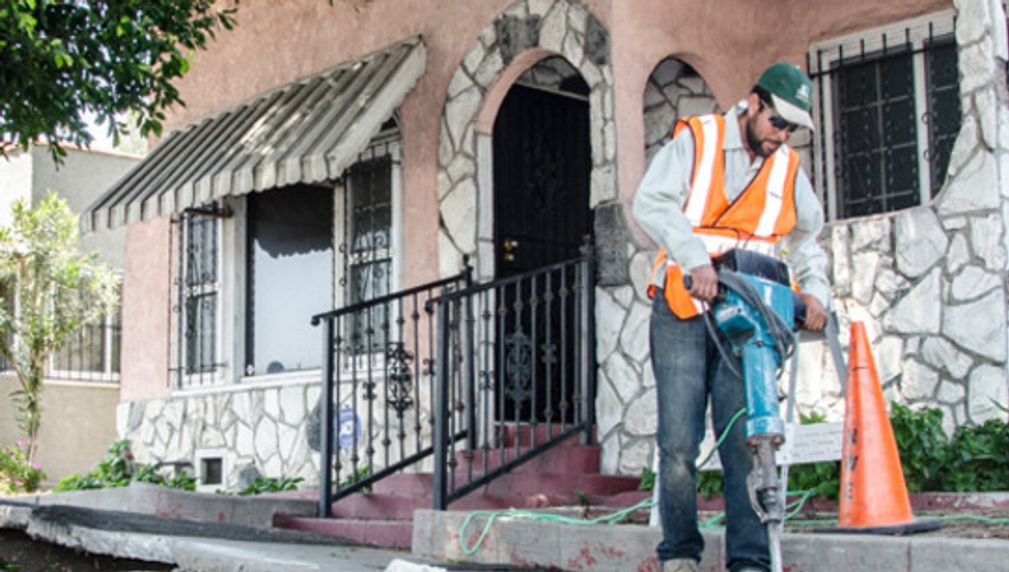Fixing the Cracks: Neighborhood Sidewalk Repair Program
LANI and the Urban Forestry Division will work hands-on with community members to guide them through the process of repairing their cracked sidewalks, making the streets of Los Angeles safer for all.

Are any other organizations collaborating on this proposal?
City of Los Angeles, Urban Forestry Division, Los Angeles Neighborhood Initiative (LANI)
Please describe your project proposal.
Cracked and broken, unattractive and dangerous, far too many sidewalks in Los Angeles are in severe disrepair. LANI, in collaboration with the City of Los Angeles Urban Forestry Division, will develop and distribute a comprehensive tool-kit to assist residents in navigating the process of repairing or replacing their own sidewalks. LANI will conduct extensive outreach, facilitate six neighborhood workshops, and work hands-on with local residents to make streets safer for all!
Which of the CONNECT metrics will your proposal impact?
Public/open streets gatherings
Government responsiveness to residents’ needs
Public transit riders
Rates of volunteerism
Transit-accessible housing and employment (the share of housing units and percentage of jobs that are located within a half-mile of transit)
In what areas of Los Angeles will you be directly working?
Central LA
East LA
San Fernando Valley
South LA
City of Los Angeles
Describe in greater detail how your proposal will make LA the best place to CONNECT?
The City of Los Angeles has over 11,000 linear miles of sidewalk with much of it in disrepair. Invasive tree roots have uplifted concrete creating cracks and large fissures that impede mobility and cause tremendous safety hazards. Nearly 40% of the city’s sidewalks are damaged based on conservative city-wide estimates.
Since 2013, LANI has been working with residents to repair and replace dangerous neighborhood sidewalks. LANI has reached out directly to homeowners to make the public right-of-way more accessible, usable and better for all, improving over 300 sidewalk locations to date. Through this effort, LANI has worked in close partnership with the City of Los Angeles, Urban Forestry Division to obtain the necessary permits required for these repairs.
Now, with considerable knowledge and understanding of the entire sidewalk repair and replacement process, LANI and the Urban Forestry Division are ready to teach local residents how to navigate the process and successfully complete their own repair projects.
LANI will develop and distribute a comprehensive tool-kit designed to walk community members through permitting and construction with clear, easy to understand steps and descriptions. LANI will conduct extensive outreach and facilitate six community workshops, in different Council Districts, to help residents understand the application process and demystify implementation. The Urban Forestry Division will participate at the community workshops, providing guidance, answering questions, and helping to break down the barrier between communities and local government. LANI will show community members how to take accurate measurements, how to secure appropriate permits, how to solicit bids and select a general contractor, and finally how to ensure that a thorough, appropriate, work product is obtained.
Through the process, community members will emerge from the experience with a renewed commitment to seeing their neighborhood improve. They will become active and empowered civic leaders with the tools necessary to affect local change.
Please explain how you will define and measure success for your project.
The success of this project will be measured by the number of community members participating in the program. Direct metrics of success will be the number of individuals attending the six community workshops; the number of toolkits distributed; the number of permits pulled by residents; the number of trees removed or pruned; and finally the number of sidewalks repaired or replaced. Immeasurable project outcomes include community empowerment as residents learn how to work with local government to initiate and complete improvement projects; improved safety for pedestrian, cyclists, transit users, the disabled community, as well as parents with strollers; increased quality of life and public health as people are encouraged to walk or cycle outdoors; and long-term revitalization benefits as communities improve.
How can the LA2050 community and other stakeholders help your proposal succeed?
Money
Volunteers
Publicity/awareness
Community outreach
Network/relationship support